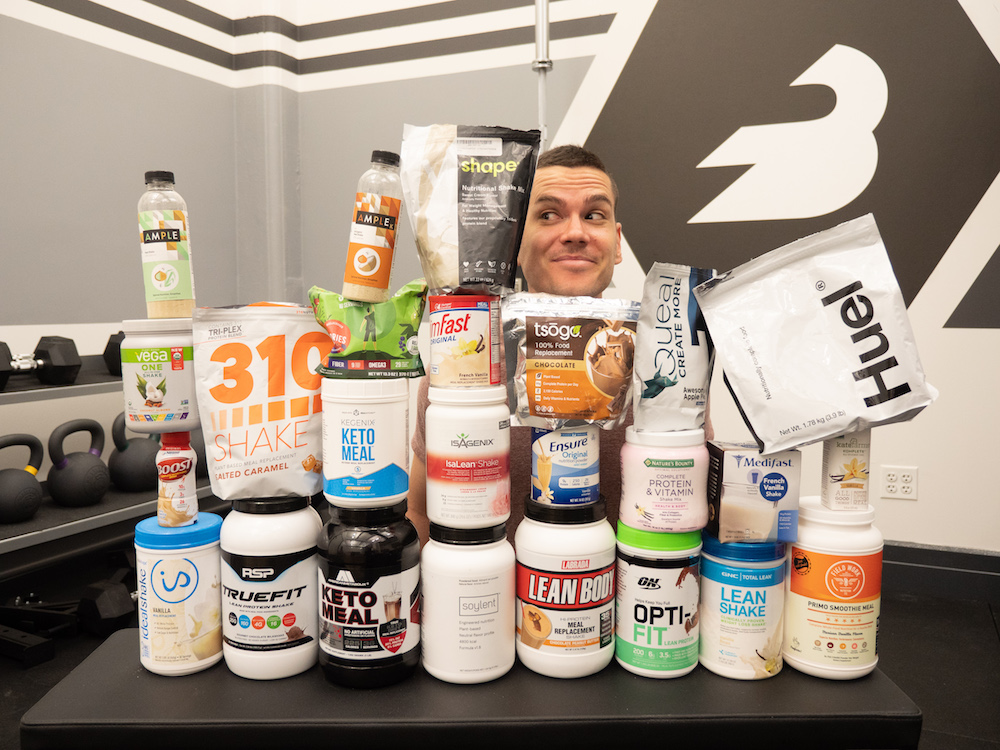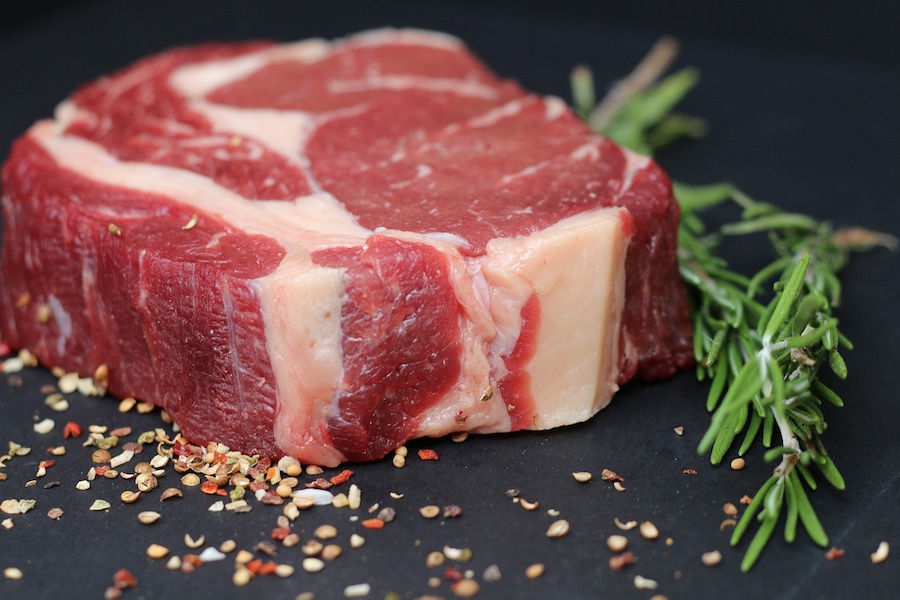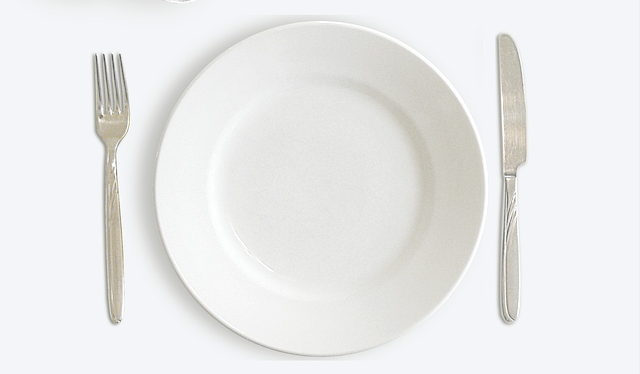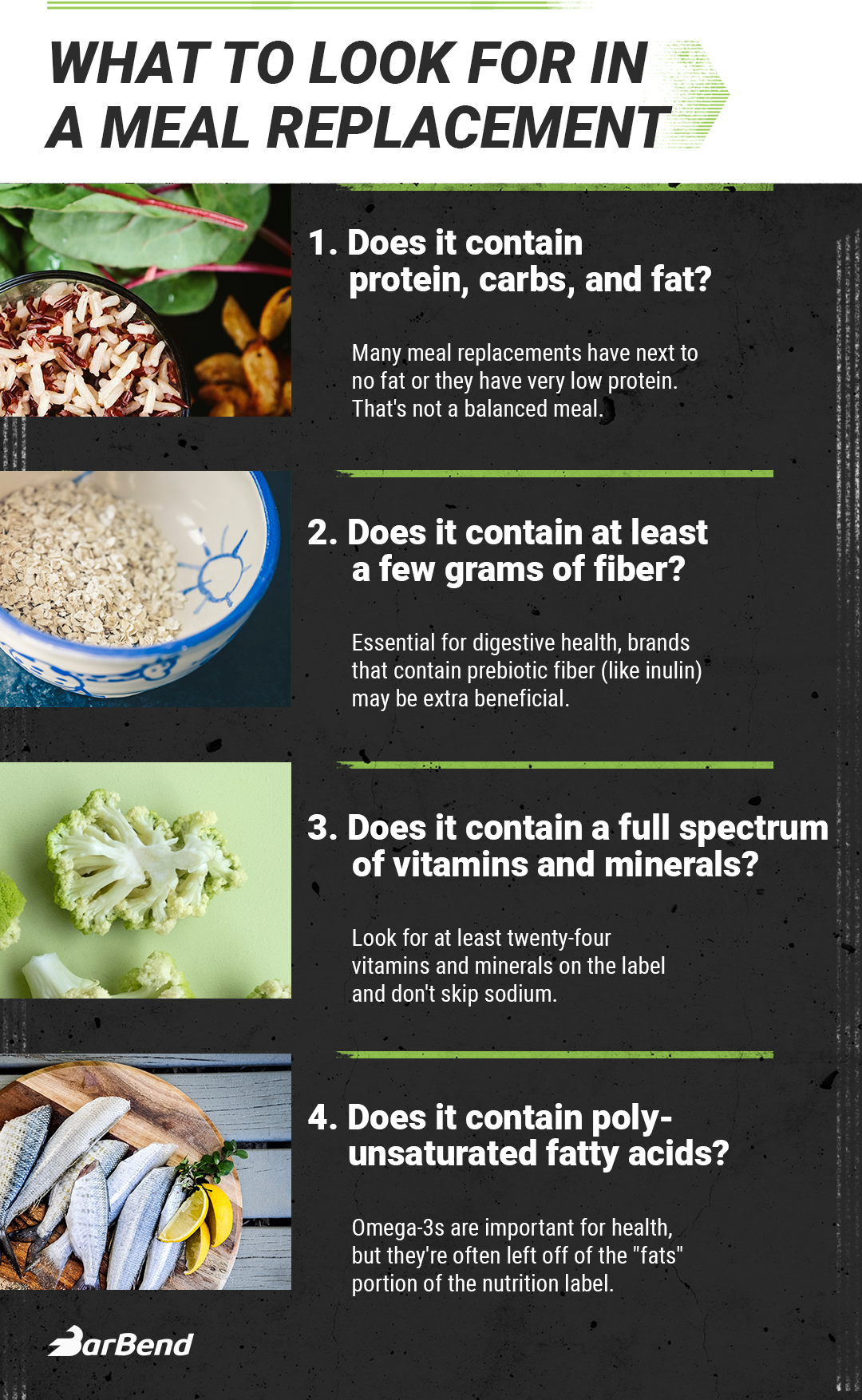So you know a guy who knows a guy who has been living on some meal replacement for days now, and you’re starting to wonder to yourself, “What is the big deal with food? Has technology overtaken it like we did with the horse and cart?”
A few years back that “horse and cart” question was actually posed by the founder of a popular meal replacement company. We used to get around on horses, then we found a more efficient mode of transportation. There’s no reason to believe we can’t come up with a more efficient way to eat, either. Right?
Meal replacement shakes do have a lot of pros and especially for athletes, they can be an easy way to get a lot of calories and carbs quickly. But there may be some issues we haven’t quite solved yet.

Pro: They don’t need cooking
It’s hard to argue with this one. Some 85 percent of Americans don’t like to cook and about 30 percent say they don’t know how. A lot of experts believe that these facts are closely tied to the exploding obesity rate.
While we’re big fans of people learning to cook, meal replacements are a very handy way to get a ton of nutrients and a controlled amount of calories — two things that are extraordinarily difficult to find when eating on the go.
Con: They don’t teach you to cook
This is a necessary flipside of the previous point. They’re great for people who don’t know how to cook, but, well, it would still be great if those people learned how to cook.
“Sure, you can use meal replacements for a few weeks to replace your meals and help with weight loss, but unless you choose to use them forever, those results may be reversed when you go back to your normal eating habits,” says New York-based dietitian Natalie Rizzo, RD.
As awesome as meal replacements can be, they don’t really teach you to prepare your own healthy meals or how to make healthy choices when you’re out and about. For these reasons, some consider them more of a bandaid than a solution to lifestyle issues surrounding food.
Pro: They can be great for athletes
If you need more calories, more protein and more carbs than the average person — and that’s how it goes for most athletes and especially active people — then you know it can be a real drag to find enough nutritious calories.
This goes double when you’re out and about: if you’re trying to eat healthy, let’s be honest, most restaurants equate that with “low calorie.” And even when you’re at home you might make a nice meal and then find it doesn’t come close to the 1000+ calories you needed for dinner. (This happens a lot when your’e cooking for others as well.) Where are you meant to get another few hundred nutritious calories? Enter meal replacements.
Con: They can be low in protein
A lot of people want different things from their diet. Some like high carb, some prefer high fat, some want a ton of calories, and all of these make it hard for companies to land on a balance for their own products.
A lot of meal replacements (particularly those designed for hospital patients) work off of the FDA’s Recommended Daily Intake, but the RDIs are largely based on what you need to avoid deficiencies. That’s why they FDA suggest 50 grams of protein per day, whereas many people — particularly athletes — prefer at least 150 grams to help them build or maintain muscle mass. Make sure the nutrition is right for you.
Pro: They don’t take much time
In those same surveys, the primary reason given for why people don’t cook was that they had a spouse or partner who did it. After that, the most common reason was “no time.” (And we’re willing to bet that if the spouse or partner were out of the picture, a lot of those respondents would switch their answer to ‘no time.’).
Meal replacements just need a few quick shakes in a bottle and they’re good to go.
Pro: It makes it easy to track calories
If you’ve ever really tried to gain or lose weight, you know that being mindful of the precise amount of calories you consume can be the hardest part, and when you eat out you typically have to guesstimate how much you’re eating.
Indeed, a 2003 meta analysis of six randomized controlled trials — often considered the best quality study you can have — concluded that meal replacements can lead to significant and sustainable weight loss.(1)
Not only are meal replacements calorie controlled, a good one can be a source of 500+ calories in your day. That’s a load off the dieter’s mind.
[Read more: 7 things you only understand when you’re trying to lose weight.]
Con: They’re often too low in calories
There’s a difference between a meal replacement and a nutritious snack, but a lot of people have trouble separating the two. Creating a calorie deficit is the only way to lose weight, yes, but a lot of people hear “low calorie diet” and think “eat as little as possible.”
The market is flooded with 100-calorie “meal replacements” and while they would make for a filling snack, nobody should consider 100 calories a meal.
Pro: They can be good sources of Omega-3
Nutrition isn’t just calories, vitamins, and minerals. Our body’s balance of essential fatty acids is also really important for immunity, inflammation, and maybe even mental health, according to a 2012 meta-analysis published in Neurobiology of Aging.(2)(3) Many take fish oil to keep their Omega-3 intake high (which is important) but some meal replacements like Huel, Soylent, and Ambronite do in fact contain a good hit of Omega-3.
Omega-3s can also be a con when it comes to these products because a lot of them, when they do include a fat source, use sunflower oil or other fats high in Omega-6. Read that label!
Pro: They can shore up nutritional deficiencies
These things are probably healthier than you think. Did you know most Americans are deficient in Vitamin D, which is super important for bone strength and mood? Most people are also deficient in magnesium, a mineral found in leafy greens that can be great for improving sleep quality. (One in three people are sleep deficient too by the way, but meal replacements won’t help that — at least not directly.)
Meal replacements pour a ton of nutrients into their product and for a lot of folks, particularly those without a solid background in nutrition, the nutrition aspect alone can outweigh every other “con” on this list.
Con: Phytochemicals
Nutrition is super complicated but nutritionists tend to value the following things: calories, macronutrients (that’s protein, carbs or fat), micronutrients (that’s vitamins and minerals), essential fatty acids (like Omega-3s), and phytochemicals.
A lot of meal replacements do fine with the first three or four but aren’t as good with phytochemicals, plant-based chemicals that have small but significant health effects. Think the antioxidant lycopene that’s found in tomatoes or isothiocyanates from cruciferous vegetables. This is a big reason to make sure you don’t ignore whole foods completely.
“It’s true you can get some nutrients that are lacking in your diet from meal replacements, but you can also do that with a multivitamin,” says Rizzo. “In my opinion, the best way to get a balance of vitamins, minerals, fiber and antioxidants is pretty simple: eat fruits and vegetables. Meal replacements tend to lack at least some of those elements.”
Wrapping Up
Meal replacements don’t deserve to be shunned and ignored because they’re not “real food.” The best meal replacement shakes can provide a fantastic balance of calories, macronutrients, and micronutrients all while saving time and effort. But there are still a lot of nutrients you can only get from whole foods, so as is usually the case, moderation is key.
Other Great Meal Replacement Reviews
- GrubSub Meal Replacement Review – Rating: 7.4/10
- American Metabolix Keto Meal Replacement Review – Rating: 8.3/10
- CalNaturale Svelte Organic Protein Meal Replacement Review – Rating: 7.7/10
- Kate Farms Komplete Meal Replacement Shake Review – Rating: 8.2/10
- Ample K Meal Replacement Review – Rating: 8.3/10
Related Meal Replacement Content
References
1. Heymsfield SB, et al. Weight management using a meal replacement strategy: meta and pooling analysis from six studies. Int J Obes Relat Metab Disord. 2003 May;27(5):537-49.
2. Cederholm T, et al. ω-3 fatty acids in the prevention of cognitive decline in humans. Adv Nutr. 2013 Nov 6;4(6):672-6.
3. Grosso G, et al. Omega-3 fatty acids and depression: scientific evidence and biological mechanisms. Oxid Med Cell Longev. 2014;2014:313570



